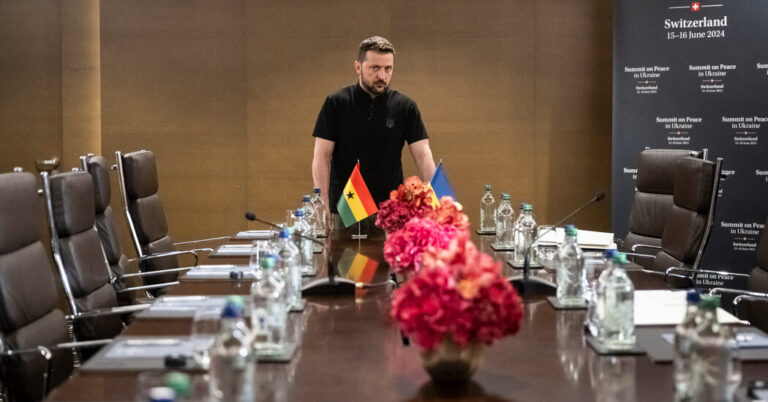Many countries meeting at a two-day summit in Switzerland joined Ukraine on Sunday in calling for “dialogue between all parties” to end the war with Russia. But Ukrainian President Volodymyr Zelensky said he remained firmly opposed to any negotiations that could force his country to cede territory.
The weekend summit drew dignitaries from around 90 countries to a Swiss Alpine resort; Russia was not invited and, for this reason, China and Brazil refused to participate.
At the end of the meeting, most delegations signed a declaration of common principles such as the promotion of prisoner exchanges and nuclear security.
They also said “further engagement from representatives of all parties” was needed to proceed, vague wording highlighting the lack of common ground on the biggest question hanging over the meeting: when and how Should Ukraine and Russia seek to negotiate peace? ?
With both countries engaged in their third year of all-out war and with no clear path to military victory for either, some world leaders are calling for negotiations and compromise between the warring sides. India, Saudi Arabia, South Africa, Turkey and others reiterated this message at the summit.
But Mr. Zelensky has long argued that lasting peace in Ukraine can only be achieved with Russia’s full withdrawal. He told reporters on Sunday that once the international community formulates a peace plan, building on the conclusions of the summit, “then this approved plan will be transmitted to the representatives of the Russian Federation.”
“And then,” he added, “we will see if they are ready to end the war.”
Asked about the prospects for negotiations, he said: “Russia can start negotiations with us tomorrow without expecting anything if it leaves our legitimate territories.”
For Ukraine, which asked Switzerland to host the summit and worked to bring together as many world leaders as possible, the event was important in creating global momentum behind Mr. Zelensky to end the conflict, which also includes reparations and justice. for Russian war crimes.
“The Russian Federation’s ongoing war against Ukraine continues to cause large-scale human suffering and destruction and create risks and crises with global repercussions,” according to the conference’s joint statement, which, according to Switzerland, has been approved by more than 80 countries.
But India, Mexico, Saudi Arabia, South Africa and the United Arab Emirates were among the few countries that refused to sign. A senior Indian diplomat, Pavan Kapoor, said his country did not approve this declaration because “only options acceptable to both parties can lead to lasting peace”.
South Africa criticized the summit for including Israel and called for intensified negotiations between Russia and Ukraine. (South Africa has accused Israel of genocide before the International Court of Justicea decision Israel called “despicable.”)
“Our actions must not exclude the possibility of Russia and Ukraine finding their way to the negotiating table,” Sydney Mufamadi, national security adviser to the South African president, said in a statement.
Ukraine’s Western allies have said little about possible peace talks with Russia. Ursula von der Leyen, president of the European Union’s executive branch, said Russia could only “be part of the efforts to bring the path of peace to its destination” if it declared itself committed to the principles of the United Nations such as territorial integrity.
“A key question remains: how and when can Russia be included in the process? Viola Amherd, the Swiss president, said. “The discussions over the past two days have shown that there are different points of view.”
Swiss officials said the way forward may be to strengthen engagement with Russia on specific priorities discussed at the summit, including ensuring safe navigation in the Black Sea and the release of prisoners of war.
Ukraine’s main ally, the United States, was represented at the summit by Vice President Kamala Harris, who left Ukraine on Saturday evening after the first day. On Sunday, President Biden’s national security adviser, Jake Sullivan, told delegates that the summit set the stage for future negotiations, without specifying when or how they might take place.
Such talks, he said, would rely on the assembled nations’ adherence to “the notion of sovereignty and territorial integrity” set out in the United Nations Charter.
“This has created a platform on which Ukraine can confidently negotiate in the future to ensure its sovereignty and territorial integrity,” Sullivan said.
To end the war, diplomatic support could strengthen Ukraine’s position in possible peace talks. But developments on the battlefield will certainly shape any settlement.
The Russian offensive launched during the winter is showing signs of running out of steam. It moved the front line by no more than about 24 kilometers, west of the town of Avdiivka in Ukraine’s eastern Donbass region.
On the Ukrainian side, American munitions and weapons are helping to tip the balance in favor of kyiv. After months of Congress delaying approval of the aid, it is beginning to arrive on the battlefield. Ukraine is expected to receive its first F-16 fighter jets this month or next, although these will only improve its military’s prospects gradually as pilots gain combat skills aboard the plane.
Mr. Zelensky said he would continue his diplomatic efforts to prepare for a second summit during which a peace plan could be presented to Russia. He said Ukraine was already in talks with countries that had expressed interest in hosting such a meeting.
But Russia has shown itself reluctant to follow Mr. Zelensky’s diplomatic path. Kremlin spokesman Dmitry S. Peskov dismissed the summit in a television interview broadcast Sunday, saying “they will not talk about peace.”
The report was provided by John Eligon from Johannesburg; Mujib Mashal from New Delhi; And Andrew E. Kramer And Natalia Novosolova from Kyiv, Ukraine.


